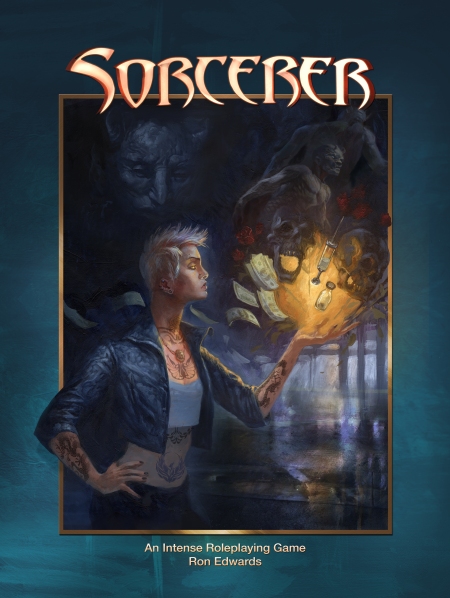17. Binding The Starting demons
After Players finish making their Characters, the Players describe how their characters contacted, summoned, and bound their starting Demons.
This is the first step of building the fiction. The Players will already have described their Demons, but it is here we’ll see what the Characters are like once they are in motion.
The Sorcerer rules cover this section well. I’ll only add a few points:
No Sorcerer ends up with a Demon by “accident.” It just doesn’t happen.
The Binding rolls will be made now, which not only establishes the relative power dynamic between the Sorcerer and the Demon, but will reveal a great deal of color about who the Sorcerer is and who the Demon is.
Don’t create a Demon “just so you can play Sorcerer.” And don’t create a Demon with the anticipation of having a conflict with your Demon. Instead, when thinking about the relationship between your Sorcerer and his or her Demon, go backward.
Remember that there are three stages of your Character’s past:
- A person before becoming a Sorcerer.
- A person who became a Sorcerer.
- A Sorcerer now facing a Kicker.
Your Sorcerer didn’t summon and bind a demon just so he could fit into this game called Sorcerer. He did it because once upon a time, for one reason or another, he needed a Demon. He had an acute need or desire that he thought was so important that he broke the rules of physics and reality and morality on fundamental level to get and secure what he needed. Between becoming a Sorcerer and facing a Kicker, your character is living a life with immense power.
So, the first thing you need to create is the need that prompted the summoning and binding of the Demon in the first place. What were the circumstances of the Character’s life? What was wrong, lacking, desired, driving him or her crazy, and so on, that so compelled this person to create something that should not be there because he or she could not see another way forward.
When you are setting up those first summon and binding rolls, remember these details. Let them color the circumstances of rituals. Let the people and places and things on the character sheet influence them as well. These are the fictional circumstances that started the relationship between Sorcerer and Demon. Not a conflict between then, but a challenge to get something done.
And, significantly, because the Sorcerer still has the Demon, in one way or another, the relationship is working out.
Things in some ways might be horrible! The Sorcerer might be doing horrible deeds. Might be lying to his wife. Might have abandoned his family. But in other ways, in the ways that prompted the Sorcerer to summon a Demon in the first place, he’s getting what he wants.
We know this because he still has the demon! The Sorcerer hasn’t banished it. Hasn’t tried to get a new one. So, at this point of the character creation process (especially at this point), don’t loose sight of this fact. The relationship, even if horribly dysfunctional (especially if dysfunctional) is getting the Character something he wants, or getting the Character closer to something he wants. The Demon is serving the Sorcerer’s needs in one way or another. And when the Kicker arrives, it is most likely the Sorcerer will rightly depend on the Demon to help him or her out even more.


You must be logged in to post a comment.